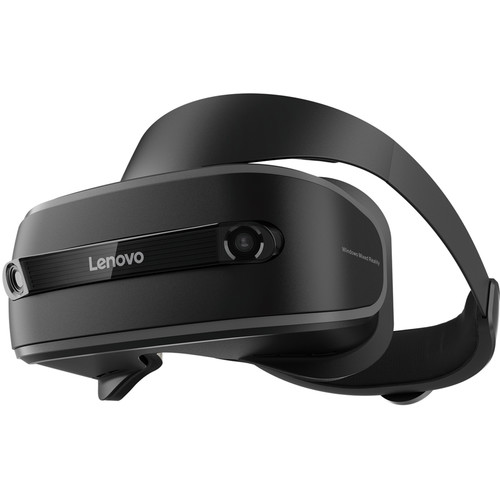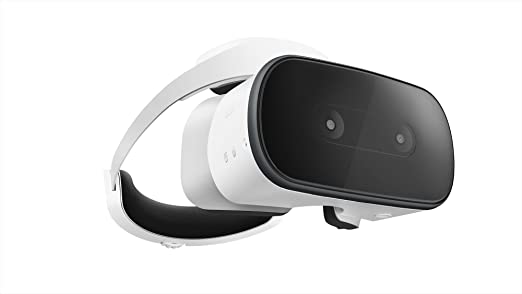Lenovo Explorer vs Lenovo Mirage Solo
When you compare the Lenovo Explorer to the Lenovo Mirage Solo you can see which VR Headset is better. Let's take a look of the comparison, and see which model of VR Headset out ontop.
What VR Headset is better?
When it comes to virtual reality headsets, the two models I am reviewing are the Lenovo Explorer and the Lenovo Mirage Solo. Both are great pieces of equipment that offer users an immersive experience in a virtual world.
The first headset we will discuss is the Lenovo Explorer. It offers users a 110 degree field of view and a resolution of 2880 x 1440 pixels. The headset also requires a minimum CPU of Intel Mobile Core i5 Dual-Core with Hyperthreading, along with Intel HD Graphics 620 (GT2). Additionally, it has room scale 360 tracking and refreshes at 90 Hz. The pro's for this headset would be its high resolution display, excellent refresh rate and compatibility with Windows PC's. A con for this headset would be its need for more powerful hardware than some other VR headsets require, making it more expensive to operate in some cases.
Next up is the Lenovo Mirage Solo. This standalone VR headset provides users with a 110 degree field of view, 2560 x 1440 pixel resolution and room scale 360 tracking capability along with 75 Hz refresh rate. It does not require any additional hardware or operating system to run like the Lenovo Explorer does. Its pros include being able to operate without any extra accessories or software requirements as well as its excellent picture quality given its low cost relative to other options available on the market today. A con for this model however is that although it can still provide an immersive experience, due to its lower refresh rate compared to some other models available on the market today there may be slight lag issues when playing certain games or watching movies that require quick response time from user inputs while using this device.
In my opinion both headsets do an amazing job when providing an immersive virtual reality experience but if I had to choose one over another I would have to go with Lenovo Explorer as it has better specs such as higher resolutions and faster refresh rates which give you smoother visuals when using your VR headset making for an even better overall experience than what you get with the Mirage Solo due too its slightly lower spec levels but still respectable performance level given its lower cost point comparatively speaking versus similar products currently available on the market today..
Specs comparison between the two VR Headsets
| Lenovo Explorer | Lenovo Mirage Solo | |
|---|---|---|
| Overview | ||
| Brand | Lenovo | Lenovo |
| Model Name | Explorer | Mirage Solo |
| Release Date | 2017 | 2018 |
| Country of Origin | China | China |
| Category | PC VR | Standalone VR |
| Battery Life | 12 h | 2.5 h |
| Display | ||
| Field of View | 110° | 110° |
| Resolution | 2880 × 1440 px | 2560 × 1440 px |
| Refresh Rate | 90 Hz | 75 Hz |
| Display Type | LCD | LCD |
| Minimum Requirements | ||
| Min. CPU Required | Intel Mobile Core i5 Dual-Core with Hyperthreading | |
| Min. Graphics Required | Intel HD Graphics 620 (GT2) | |
| Min. RAM Required | 8 GB | |
| Operating Systems | Microsoft Windows | |
| Sizing | ||
| Weight | 380 g | 645 g |
| Dimensions | 185 × 95 × 102 mm | 204 × 270 × 180 mm |
| Features | ||
| Room Scale? | YES | YES |
| 360 Tracking? | YES | YES |
| Positional Tracking? | YES | YES |
| Front Camera? | YES | YES |
| Eye Tracking? | No | |
| Usable with Glasses? | YES | YES |
| Cooling System | No | |
| Built in Headphones? | No | |
| Built in Microphone? | No | YES |
| Flip Visor? | YES | |
| Voice Command? | YES | |
| IPD Adjustment? | YES | |
| Lens to Eye Adjustment? | YES | YES |
| USB? | YES | YES |
| Display Port? | YES | |
| HDMI? | YES | |
| MicroSD? | YES | |
| Bluetooth? | YES | YES |
| Wifi? | YES | |

